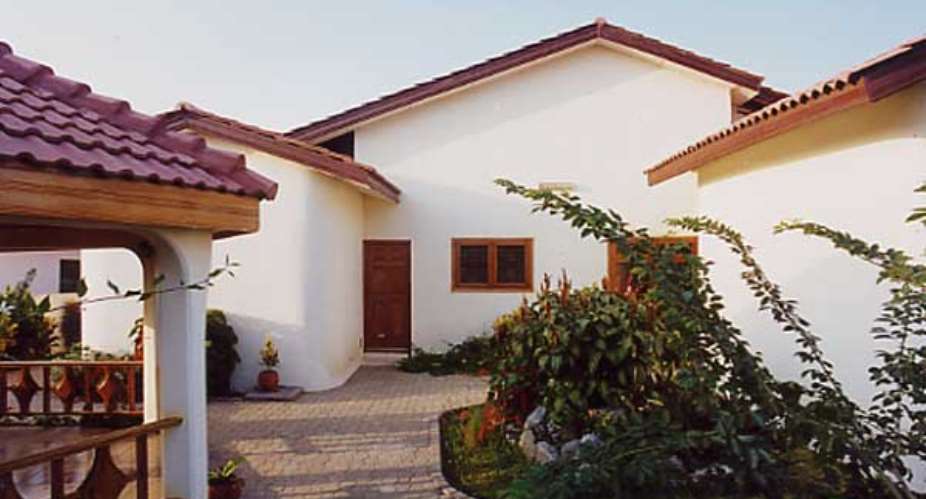THE increasing cost of land, building materials, services and other inputs in the housing industry is putting the acquisition of houses beyond the reach of many Ghanaians.
Currently, real estate developers are quoting at least $30,000 (equivalent to ¢270,000 million) for a semi-detached house located in what is considered a low-class area. Significantly, that amount is the cheapest on the market.
With the minimum wage pegged at ¢13,200, many Ghanaian workers are unable to acquire houses at the minimum price being quoted by real estate developers.
The Managing Director of Devtraco Limited, a real estate developer, Mr J. S. Aidoo, admitted in an interview that the houses built by real estate developers were beyond the pockets of many Ghanaians but attributed the situation to the high cost of inputs.
He added that much as real estate developers were concerned about the situation, they were not "Red Cross" organisations but business organisations which had to make profit.
Mr Aidoo said the difficulty in the acquisition of land, including the multiple sale of land, was seriously affecting the industry.
He cited an instance when his company arranged to purchase a piece of land and made initial payment, only to realise later that the owners of the land had sold it to other developers and offered to replace it with another land.
Such an attitude, he said, affected the industry because apart from the legal contest that developers had to go through before acquiring land, it also did not encourage the banks to give loans to real estate developers.
He called on the government to intervene by reducing duties on the importation of raw materials for the building industry, which constituted about 80 per cent of inputs. Some of these are clinker for the manufacture of cement, iron rods, roofing sheets, door locks, louvre blades and wall tiles.
Mr Aidoo also suggested to the government to hold land in trust for the people and deal directly with operators in the building industry in order to eliminate the problem of multiple land sales and land litigation.
Furthermore, the government should help to provide the infrastructure in the developed areas to reduce the cost of houses.
A member of the Ghana Real Estate Developers Association (GREDA), Mr Torgbor Mensah, said much as he did not have any problem with the price of cement, the high cost of other inputs like land and services was greatly affecting the industry.
Other operators in the industry, however, indicated that cement price differentials were discouraging individuals and real estate developers from putting up buildings outside Accra.
This is because the price differentials in the commodity made it cheaper to build in Accra than in other parts of the country.
The Executive Director of GREDA, Mr William Opare, said the high cost of cement and other inputs was undermining efforts by real estate developers to put up affordable houses for the people.
An advertiser's announcement published recently by the management of GHACEM, one of the two manufacturers of cement in the country, in some newspapers indicated a difference of ¢20,000 in the price of cement in Accra and the price in Wa.
Ghacem's recommended retail price of cement in Accra is ¢53,000; Kumasi and its environs, ¢59,000; Sunyani and its environs ¢62,000; Tamale and its environs, ¢66,000; Bolgatanga and its environs, ¢70,00, and Wa and its environs, ¢73,000.
Mr Opare noted that the price of cement had increased rapidly over the years from ¢3,750 in 1995 to the current price levels and stressed the need to contain the situation to make houses more affordable.
He asked GHACEM to sell cement at ex-factory price to real estate developers and other large scale users of the commodity. The company could also consider transporting the commodity by water to cut down cost.
Mr Opare mentioned the use of local raw materials for building as another alternative that could help address the problem of high prices of cement and houses. He, however, pointed out that a lot of education had to be carried out, since many people had become used to living in cement houses.
In a separate interview, the Communications Manager of GHACEM, Ms Abena Konadu-Agyeman, said that the company had not increased its ex-factory price after the petroleum price increases last month.
She explained that the variation in the prices of the commodity was because of transportation cost from region to region, adding that Ghacem had contracted private companies to transport the commodity. The company only supervised the transportation but had no control over the cost of transportation.
Ms Konadu-Agyeman said Ghacem could not control the market price because the free market environment did not permit that. She, however, appealed to the distributors to sell the commodity within the recommended prices.





 We’ll no longer tolerate your empty, unwarranted attacks – TUC blasts Prof Adei
We’ll no longer tolerate your empty, unwarranted attacks – TUC blasts Prof Adei
 Bawumia donates GHc200,000 to support Madina fire victims
Bawumia donates GHc200,000 to support Madina fire victims
 IMF to disburse US$360million third tranche to Ghana without creditors MoU
IMF to disburse US$360million third tranche to Ghana without creditors MoU
 Truck owner share insights into train collision incident
Truck owner share insights into train collision incident
 Paramount chief of Bassare Traditional Area passes on
Paramount chief of Bassare Traditional Area passes on
 Two teachers in court over alleged illegal possession of BECE papers
Two teachers in court over alleged illegal possession of BECE papers
 Sunyani: Victim allegedly shot by traditional warriors appeals for justice
Sunyani: Victim allegedly shot by traditional warriors appeals for justice
 Mahama vows to scrap teacher licensure exams, review Free SHS policy
Mahama vows to scrap teacher licensure exams, review Free SHS policy
 Government will replace burnt Madina shops with a new three-story, 120-store fac...
Government will replace burnt Madina shops with a new three-story, 120-store fac...
